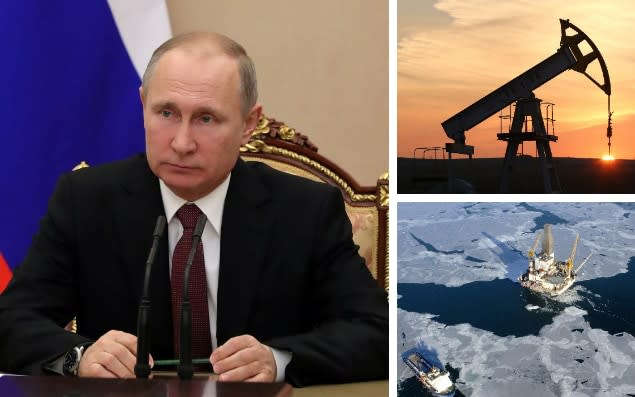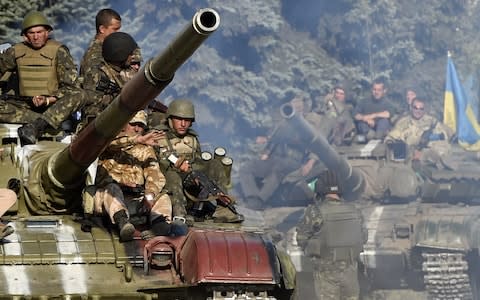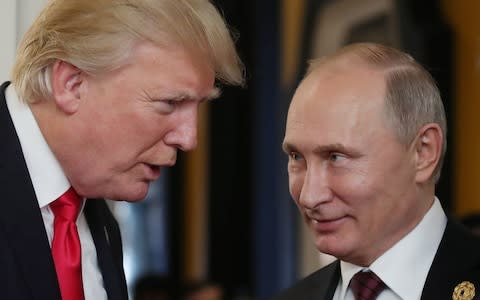Moscow is out-manoeuvring the West and becoming a real threat to our stability

In a bid to persuade the Treasury to cough up more for his department, Gavin Williamson, the new Secretary for Defence, painted a nightmare scenario last week. As our world leaders gathered in Davos, he asserted that Russia was in a position to launch an attack on our critical national infrastructure (CNI) that could claim many thousands of British lives.
Mr. Williamson correctly identified that Russia is back with a vengeance on the global strategic stage. Indeed, Moscow has all but eclipsed the West in Syria and he is undoubtedly right in assuming that Russian has the capability of attacking our CNI – that is the networked structures which underpins our utilities, telecoms, transport and financial systems.
Yet the minister does not fully grasp Russia’s strategic priorities in Europe. Russia doesn’t seek to kill the golden goose – it wants to see it fat, indolent and weak. In essence, Russia wants to see Europe and the UK’s dependency on its oil and gas grow. It currently supplies a third of the EU’s gas and oil imports, including a growing proportion of Britain’s.
Moscow is determined to push through this economic priority in Europe despite the extensive financial and commercial sanctions which the EU and the US imposed since the Ukrainian crisis began in 2014. It knows very well that Germany and Italy are especially dependent on Russian energy and their business communities are continuing to push for a relaxation of sanctions.
So, by holding his nerve, Mr. Putin can relax and enjoy how the world looks through the windows of the Kremlin. Certainly, neither he nor his most senior colleagues felt it necessary to join the cavalcade of presidents and prime ministers making their way up the Magic Mountain in Davos.
And why would they? Russia is confidently dictating the course of European and Middle Eastern geopolitics. At every turn, Moscow is out-manoeuvring the West and becoming a real threat to our stability. Yet remarkably, it is doing this despite a lamentably weak economy. In 2017 the Russian economy was a tenth of the size of the US economy and only half that of Britain’s. And Russia’s defence budget is six times smaller than the US’s and a tenth of NATO’s. Its GDP has declined astonishingly from $2.1 trillion in 2013 to $1.1 trillion last year. Yet for all this, its global and military influence is rising inexorably. How has this happened?
When I was researching McMafia, my book about the globalization of organised crime, I visited Moscow and St. Petersburg several times from 2004 to 2006. I noticed that officials, whether policemen, customs officials or FSB personnel, had regained some of the swagger that I knew well from Soviet times. In their eyes, individuals, whether foreigners or locals, were inferior entities whose role was to obey the state not to question it.

Putin’s determination to restore a degree of authoritarianism in Russia was not unpopular. The 1990s had seen the economic certainties of the Soviet system replaced by the volatile and violent roller coaster of gangster capitalism. At the time, oligarchs like the late Boris Berezovsky and organized crime groups effectively controlled the then President, Boris Yeltsin. The newly formed FSB was a pale shadow of its predecessor, the KGB, while ordinary Russians became deeply impoverished.
In order to restore the authority of the FSB, Putin flipped all this on its head. In a series of carefully choreographed moves, the state re-established its authority of the oligarchs and the gangsters. They would now do Putin and the FSB’s bidding – not the other way around. This strategy involved building on anti-Western sentiment. In the popular mind, gangster capitalism had been promoted and sponsored by the West.
If the 1990s had left the Russian military in an atrocious state; humiliated in Chechnya, riddled with corruption and criminality, and ill-suited to the strategic challenges of the new century, the past decade has been one of renewed strength and sense of power and purpose. Russian defence planners have not been idle. In a landmark assessment of Russia’s capability last year, the US Defense Intelligence Agency noted how the Ukraine conflict in 2014 made NATO sit up and think. ‘The operation gave the world its first look at a military that appeared surprisingly disciplined and well-equipped…Ukrainian forces have stressed the capabilities of the Russian units, especially with respect to command and control, artillery firepower and air defense.’

A year earlier, Russia’s top general, Valery Gerasimov, had formulated what became known as the Gerasimov doctrine. The commander was frank that Russia could not maintain parity in conventional weapons or indeed in AI and robotics with the West. Somehow Russia had to compensate for the imbalance. “The role of non-military means…has exceeded the power of the force of weapons” he wrote, adding that Russia would now have to focus on “military means of a concealed character, including the implementation of informational conflict.”
Gerasimov identified the vulnerabilities in Western defences. But these were political and not military. So, for relatively little investment, Russia supported movements which could potentially destabilise the West - either – either through hacking groups like Fancy Bears, responsible for breaking into the Democratic National Committee and John Podesta’s email account; or through bot nets supporting the populism movements; or, in the case of France’s FN, by loaning them money.
This has all contributed to a sense of chaos and confusion of politics in the US and across the European Union, at very little cost to themselves. The last thing Putin and his friends need is to make the journey to Switzerland merely to hear lectures from the West about Russia’s perfidious behaviour.
At a glance | Sanctions against Russia
Instead, the Kremlin is letting others talk, while Russia continues to fashion Syria’s future on the ground. President Bashar Al-Assad is now closing in on victory thanks to sustained Russian military assistance. Meanwhile, the weakness of the United States and its allies are repeatedly exposed.
Last week witnessed a particularly humiliating episode. Washington’s NATO ally, Turkey, launched an offensive into Syrian territory with the aim of throttling the YPG, the Syrian Kurdish force that, in coordination with the US military, had played such an important role in defeating ISIS. Washington, unwilling to break with Istanbul, looked away and muttered something under its breath as the Kurds felt the full force of what they consider American betrayal. Moscow, by contrast, offered vocal support to President Erdogan, driving the wedge between Istanbul and Washington still further.
Vladimir Putin may be a ruthless KGB officer who uses the full might of the Russian state to remain in power. But as a practitioner of global statecraft, he has no equal these days. Even Angela Merkel who understands Putin like no other western leader is struggling to stay afloat politically.
And it is the West’s political divisions that are key to Russia’s success, critically weakening its ability to develop coherent coordinated policies both in Ukraine and the Middle East.

The KGB/FSB has been building its file on Trump since he first visited Moscow in 1987 and Special Council, Robert Mueller’s probe will reveal the extent to which Russian Organised Crime may have used his properties to launder money. But whether Trump is able or willing to lift sanctions against Russia is in some respects unimportant (the sanctions regime is driven by Congress rather than the President). It is the disruption to Western power from within, leading to the collapse of any strategic vision on the part of NATO from which Russia is now deriving its strength.
And the Kremlin’s recent embrace of China means that if the West is unable to extract itself from its current internal chaos, it is Beijing and Moscow who will shape the post-Cold War world, not the Western victors in that conflict. While the Russians said that Gavin Williamson had lost his ‘grasp on reason’ over his claim of an attack threat, he was right in saying that they have the power to influence the world in an entirely novel way. And they know what they are doing.
